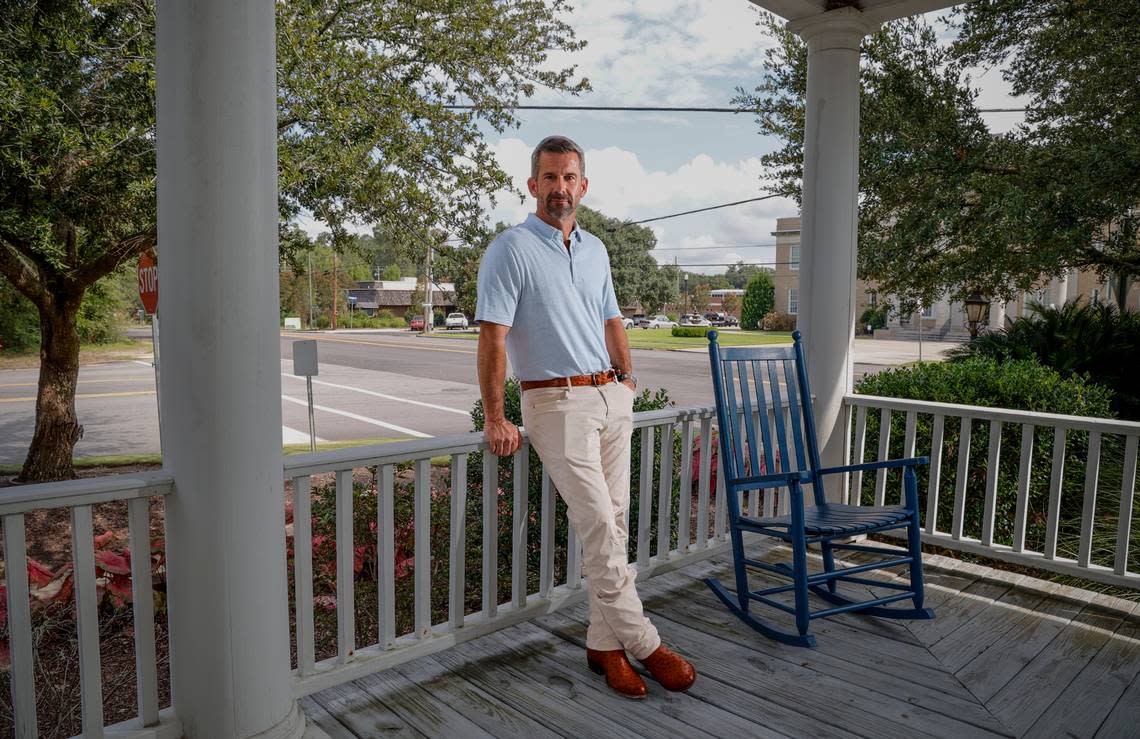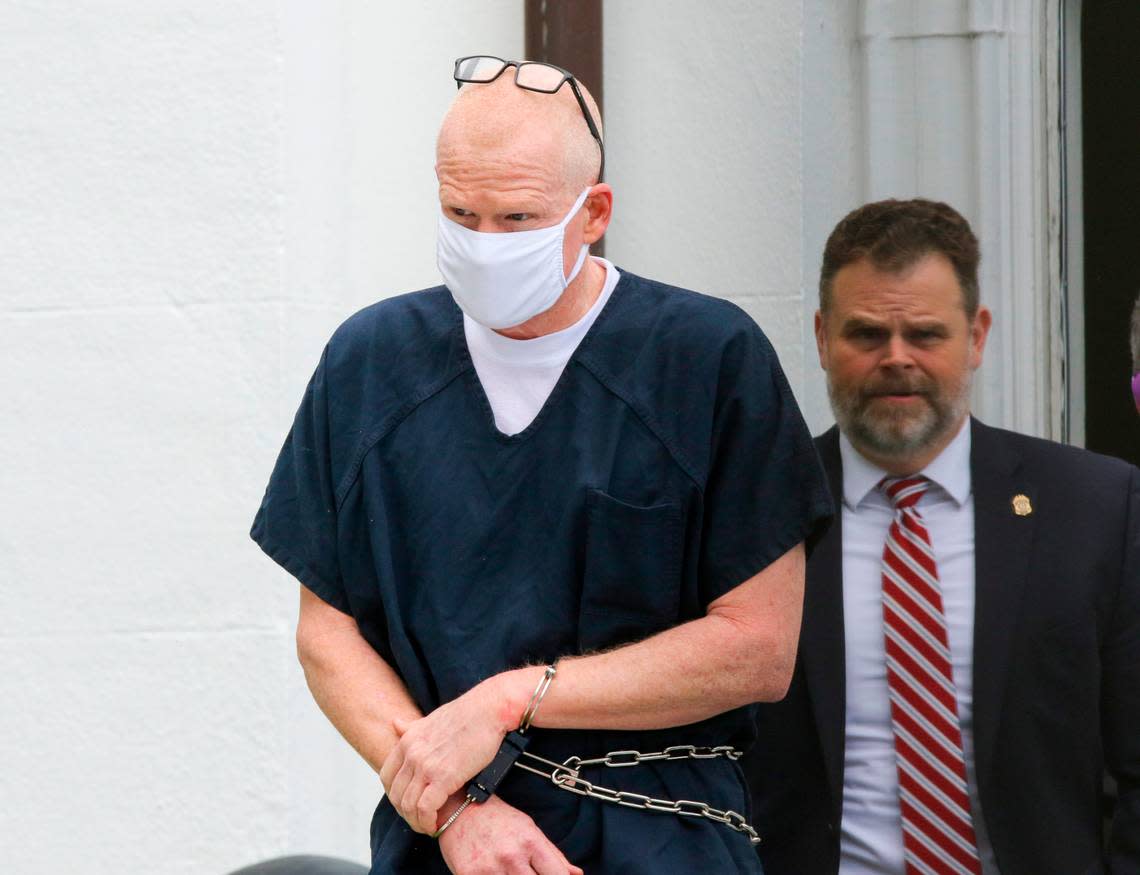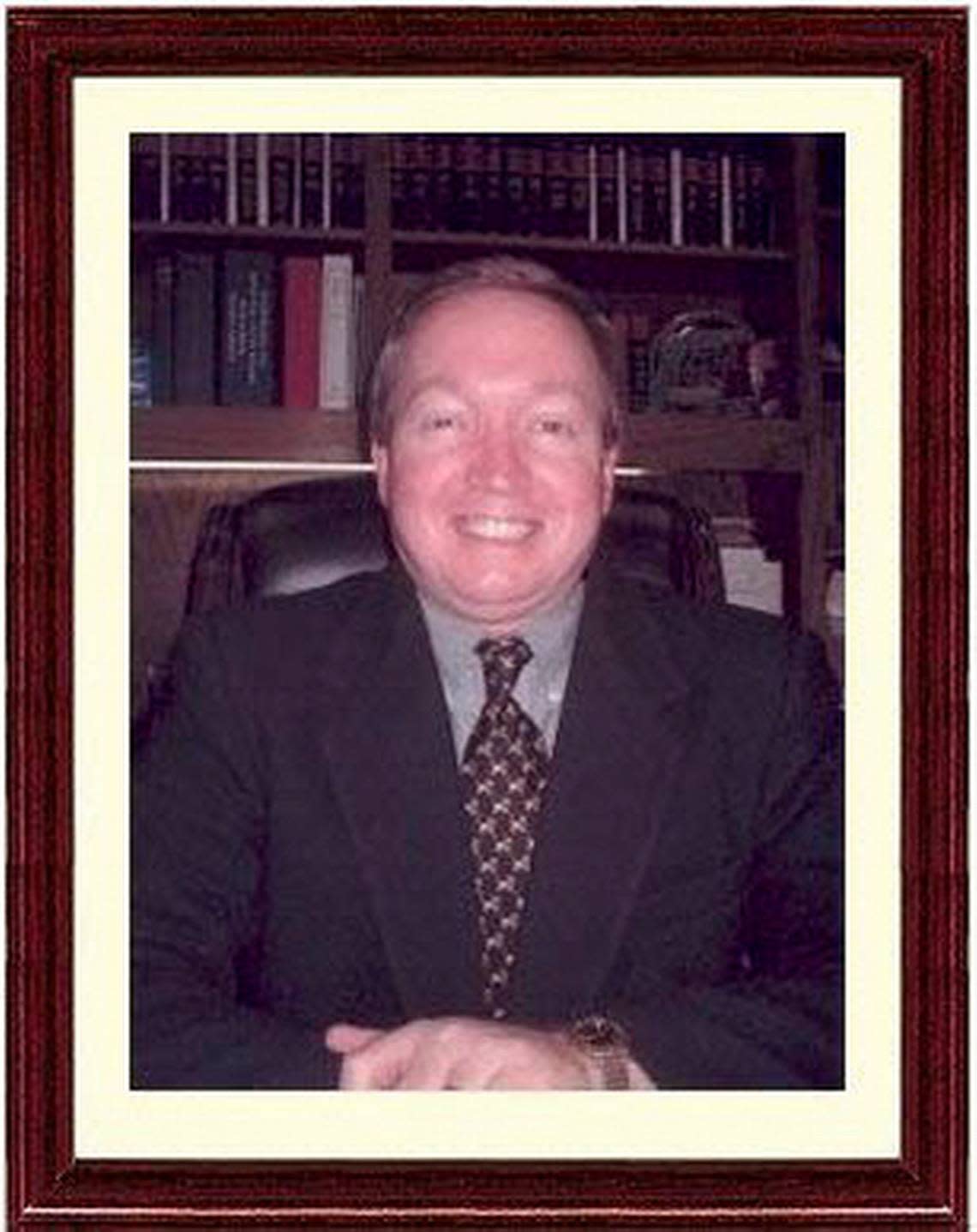Murdaugh stole his money, lawsuit says. Then, companies got his children’s millions
Arthur Badger Jr. became a single father of six on January 28, 2011, when a UPS truck drifted across the center line on U.S. 278 in Allendale County.
In an instant, Donna Hay Badger, 35, was gone. Arthur, who was driving, remembers every moment of the collision that caused the death of his wife and partner of 12 years, but he doesn’t like to talk about it.
Arthur’s attorney, Alex Murdaugh, negotiated a multi-million dollar settlement in a wrongful death lawsuit against UPS in late 2012.
Then came the betrayal. In the years following the wreck, Murdaugh, along with former Palmetto State Bank CEO Russell Laffitte, quietly stole more than $1.3 million from Donna Badger’s estate, where the settlement money had been placed, according to state and federal indictments.
Arthur is among a long list of former clients allegedly defrauded by Murdaugh, who has become a household name in an unfolding drama of murder and financial intrigue. Once the head of a prominent S.C. legal family, Murdaugh is in jail awaiting trial on several financial charges and the murder of his wife and son.
The Badger children’s money, also received from the wrongful death lawsuit, should have been safe. Placed into financial arrangements called structured settlements, each child was to receive periodic tax-free payments — primarily in the form of monthly checks — once they turned 18. In total, $4.8 million would go to the six children over several decades.
But nearly all of that money is gone too, sold to companies that paid the cash-strapped Badgers small amounts of immediate money in exchange for their millions of dollars in future payments. The three youngest Badger children, for instance, received 7 cents on the dollar from the companies.
A close examination of how the Badger children lost their money casts a light on how these private companies operate. Known as structured settlement factoring companies, they and their investors are legally receiving checks originally meant to provide financial security to children who have suffered trauma, adults injured in wrecks who can no longer work and others with debilitating injuries.
The sales also raise questions as to whether judges who approve the deals are adequately scrutinizing them and whether lawmakers, who created safeguards to protect sellers, are doing enough.
In the Badger children’s cases, the deals were approved by a judge who seems to be a favorite among several factoring companies, according to a months-long investigation by McClatchy. He hasn’t denied a deal a company has brought before him during at least the past eight years, the newspaper found.
John Darer, a Connecticut-based watchdog who hosts a blog chronicling what he believes is widespread abuse in the factoring industry, said deals involving minors’ future payments are rare, but not unprecedented.
“It’s absolutely the most despicable predatory behavior I’ve witnessed in my 17 years commenting (on) and researching these companies,” he said of companies’ willingness to target children’s payments. “The lowest of the low.”
The Badger family’s attorney, informed about these deals by McClatchy, compared the actions of those involved in these transactions to the Murdaugh saga that has gripped the nation’s attention.
“I mean, Alex is a criminal and so his criminal acts, they aren’t really that surprising at this point,” said Mark Tinsley, who has had a front-row seat to the unfolding of Murdaugh’s supposed misdeeds as the attorney for the Badgers and the family of Mallory Beach, the Hampton County teenager who died in the 2019 boat crash that led to charges against Alex Murdaugh’s late son, Paul.
“... This is worse, or certainly strikes me as more unconscionable than (what Murdaugh did).”

Selling the children’s future payments
In 2018, the Badger family was at a financial breaking point. It had been six long years of Arthur providing for his large family without his wife by his side.
Bills were piling up. The county was threatening to take the family’s home due to unpaid taxes.
Little did Arthur know that there was money owed to him that could have fixed the problem. Enough money to buy one of the most expensive houses in all of Allendale County in fact.
More than $1.3 million had been set aside for him in his late wife’s estate from the wrongful death lawsuit.
But he didn’t know it. Murdaugh, his attorney, never told him, according to a lawsuit Arthur filed in June.
Instead, Murdaugh deceived Arthur into resigning as the estate’s personal representative, while Laffitte took over, according to the lawsuit against the pair and Palmetto State Bank. Then, Murdaugh and Laffitte settled the lawsuits against UPS without informing Arthur and his kids.
The conspirators set up a fake structured settlement for Arthur through the bank and diverted the money at Murdaugh’s request, the complaint states.
Arthur’s money went to Murdaugh’s credit card company, an auto dealership and his family members, according to the indictments. Laffitte used some of the money to pay back loans that he and Murdaugh had unlawfully taken from other clients’ settlement funds, according to the documents.

In addition to stealing Arthur’s portion of the settlement, Murdaugh and Laffitte also mismanaged the kids’ proceeds, Tinsley alleges.
In legal cases involving the wrongful death of a parent, a portion of the settlement money is often placed into a conservatorship account that is managed by a probate judge, Tinsley explained. The money can be used to pay for a child’s needs such as a prom dress, school trips and braces.
Murdaugh and Laffitte had done that in previous cases, Tinsley said, but not with the Badgers.
“And it really begs the question, well why didn’t they do it?” Tinsley asked. “I think they didn’t do it because they were trying to figure out how to steal it.”
Meanwhile, Arthur was struggling to make ends meet for his family.
That’s when his oldest daughter, 21 at the time, suggested he look into selling some of the younger kids’ future payments from their structured settlements. She had been solicited by mailers from factoring companies and already sold $76,500 of her future payments for about $14,400 in three transactions.
“She told me I should try for my other kids,” Arthur said. “Because she got hers, I guess. She knew I needed some money. We was doing a little bad.”
That May, Judge Walter Sanders, Allendale County’s part-time master-in-equity, allowed Arthur to act on his 11-year-old daughter’s behalf in selling $110,160 of her future payments for $15,000.
Within the span of a few months, Sanders approved six more deals with Arthur acting on behalf of his minor daughters, ages 8, 9 and 11. In seven deals, the factoring companies purchased more than $2.8 million worth of their future payments for a total of $200,000. The discounted present value of those payments — a calculation based on a federal rate that assumes money in the future is worth less than the present — was estimated at more than $1.7 million.
The factoring companies involved in the deals used various names in court filings: Funding Direct LLC, Berkman First Funding LLC and Pitchberg Funding LLC. They were all registered to the same address in Delaware that’s actually the address of a company that incorporates limited liability companies.
Delaware is a popular state for businesses to register LLCs due to low taxes and minimal disclosure requirements.
McClatchy was able to link Pitchberg Funding to a Maryland man named Ryan Blank. The Maryland Attorney General’s Office banned Blank and several of his business associates in 2018 from doing business in the state after an investigation found they were acting deceptively in pushing structured settlement transfer deals through the courts.
Blank and his partners sent thousands of mailers to structured settlement recipients that made false claims and used fake names, including a non-existent Judge Larry C. David, purportedly a reference to the famous comedian and creator of the TV show, “Seinfeld,” according to the settlement agreement outlining the investigation’s findings.
The agreement notes that Blank and his associates dispute the findings but agreed to a resolution to avoid costly litigation. They were banned for seven years and ordered to pay restitution.
Messages left for Blank and his associates were not returned. The Maryland attorney who represented them in relation to the Attorney General’s investigation also did not return a request for an interview.
Arthur said he believed he was working with the same company for all of the transactions and the company representative’s signature on applications for Pitchberg and Berkman First Funding were the same. But that couldn’t be confirmed.
All of the future payments were ultimately assigned to SuttonPark Capital, a Florida factoring company well-known in the industry for underwriting third-party transactions, meaning they fund other companies that solicit sellers and finalize these transactions.
Representatives from SuttonPark also did not return messages seeking an interview.
The transactions involving the minor Badger children, representing a return of about 7 cents on the dollar, were among the most lopsided S.C. deals reviewed by McClatchy, which compiled complete data for more than 1,400 transfers.
There are several others that received a lesser return, including a Colleton County woman who was permitted to sell more than $1.6 million worth of future payments for $4,225 in 2019. But almost all of those deals involved life-contingent payments. That means those payments would only be distributed if the structured settlement recipient is still alive at the time they’re due.
All of the Badgers’ payments were guaranteed, meaning that even if one of them died before a future payment was due, it would still get distributed to another designated beneficiary — in this case, the factoring company.
Arthur said in a July interview that he didn’t realize the dollar value of the future payments he had sold until a McClatchy reporter contacted his attorney, Mark Tinsley, wanting to speak with them for this story.
S.C. law requires factoring companies to get sellers to sign disclosure forms, listing the dollar amount they’re selling and receiving.
Blank and his partners in Maryland were found to have given sellers “insufficient time” to read terms and conditions before signing transfer agreements, according to the Attorney General’s investigation.
“I felt like I was robbed,” Arthur said about finding out he had given up millions of his children’s money.
Tinsley was likewise shocked and skeptical a judge would sign off on such deals until a McClatchy reporter directed him to copies of the court filings online.
“I don’t know what else to say; it’s just shocking to me, completely,” he said.
It turned out the Badgers happened to live in the perfect county for factoring companies that want to get lopsided transactions approved.
Factoring companies’ favorite judge
In the southwest corner of South Carolina, just north of Augusta, Georgia, sits Allendale County, the state’s least populated and poorest county.
It’s lucky to have its own master-in-equity. Only half of S.C. counties have one of these judges who rule in non-jury matters, most often foreclosure filings and other real estate-related issues, referred to them by circuit courts.
The man who’s served in the role since 1991 is Walter Sanders, an attorney who handles his judicial duties on Tuesdays from his Fairfax law office.
Masters-in-equity are appointed by the governor based on recommendations from local legislators and deemed qualified by the S.C. Judicial Merit Selection Committee. Sanders was reappointed to another six-year term last year.
Tinsley noted that Sanders generally has a good reputation within the small, tight-knit community. McClatchy’s analysis found that reputation extends to some of the factoring companies as well.
Since 2014, Sanders has approved 83 structured settlement transfers without denying a single one, according to court records. For the 42 deals he approved where full data was publicly available, the factoring companies purchased more than $14 million in future payments for less than $1.7 million.
That represents an average of less than 12 cents on the dollar, the lowest average for approved deals by any judge or special referee in South Carolina that approved at least 25 such cases between 2014 and last year, according to McClatchy’s analysis.
North Charleston-based attorney Richard Steadman, in particular, appears to favor bringing these cases before Sanders.
Steadman, who represented the factoring companies in all the deals involving the minor Badger children, appeared before Sanders for 67 approved transactions between 2014 and 2021, according to the newspaper’s analysis. That’s nearly twice as often as his clients, the factoring companies, gained approval from any other S.C. judge.
Steadman said he brings cases to Allendale because of “good scheduling” there. He said he did not have any relationship with Sanders outside the courtroom.
“(Sellers) don’t do (these deals) without having some general, immediate need, so a delay is critical to them,” he said.
The majority of the transfer cases he files benefit sellers, he said, because the funding provides opportunities they might not otherwise have to buy a house, pay for college tuition or get out of debt.
“Often they cannot otherwise obtain financing or funds to do things, so it generally is a good thing for them,” Steadman said.
Sanders, the Allendale judge, spoke to McClatchy in April about how he generally handles the cases. But he did not respond to multiple requests for a follow-up interview that would have included specific questions about the Badgers’ deals.
Attempts to reach Sanders included calls, emails, a visit to his Fairfax office and a certified letter outlining McClatchy’s findings sent to his home.

Sanders said during that April interview that the difference between what sellers get versus what they give up often shocks him. But he finds they usually have a legitimate, pressing need for the money.
“Most of the time, I personally wouldn’t do it myself, and I usually tell them that,” he said.
None of his actual conversations with the sellers could be confirmed because Sanders — like many judges in South Carolina told McClatchy — doesn’t require court reporters for the hearings.
The one reason Sanders said he would deny a deal is if a person had previously sold a portion of their structured settlement, though McClatchy found no orders of denial by him since 2014.
And he approved 26 separate transactions for the six Badger children.
Those approvals are in spite of a judge’s order seemingly restricting those deals.
The final paragraph of the court order establishing their structured settlement, signed by Circuit Court Judge Carmen Mullen, states that those future payments cannot be sold, assigned or transferred.
Badger settlement order by David Weissman on Scribd
That language, known as an anti-assignment provision, is commonly attached to structured settlement agreements, according to industry experts, but it’s not always backed by a court order.
Tinsley is hoping to use Mullen’s order to nullify the deals, he told McClatchy.
In instances where there’s an anti-assignment provision attached to the structured settlement, Steadman said those are bypassed when the annuity company agrees to waive or not enforce it.
Sanders did recall the Badger deals in that initial interview, commenting that he’s never seen so many children.
“Their lawyer did a good job getting all that money for them (in the original structured settlement agreements),” he said, perhaps not realizing their attorney was Murdaugh, now indicted for allegedly stealing from clients.
